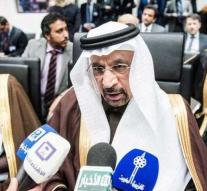
'Cartel OPEC quarrels about oil price'
- Oil cartel OPEC disintegrates into camps. Internally, a battle has broken out about the desirable price that the fourteen countries are going to introduce. Saudi Arabia and Iran are diametrically opposed.
Saudi Arabia, the largest producer and the one that has determined prices through inventory management, sees an increase to $ 70 per barrel as desired. Iran starts from $ 60 per barrel. The oil cartel puts the price at the pump for a large part.
Both extremes in prices represent diverging views on the development of the future oil price, as American producers of shale will increase their production even further and lower the oil price.
According to Bijan Zanganeh, in an interview with the Wall Street Journal, Iran wants the price for Brent oil to drop to $ 60. With this, the country thinks it can keep the shale suppliers partly out of the market. They would not make enough margin at that price. 'If the price rises to $ 70, it will increase production in shale in the US', says Bijan Zanganeh.
Saudi Arabia, however, does not claim to be impressed by the capacity of the shale suppliers, certainly not to get the price below $ 70.
' I do not lose sleep because of that shale and would surpass us, 'said Khalid al-Falih, energy minister of Saudi Arabia in January. Never before has the price of $ 70 been explicitly mentioned, according to the Wall Street Journal this is the internal consensus.
In January, global production, already filled by OPEC agreements, went down to a nine-month low.
The market also saw the postponement of the stock exchange listing of the largest oil company in the world, Saudi Aramco. That stated last week that oil companies will have to make up to $ 25 billion in investments in the coming 25 years to continue meeting the rising demand.
According to macro economist Hans van Cleef (ABN Amro), the entire oil market has become the grip of higher production in the United States on the one hand, and OPEC's long-term policy on the other.
'Investors tend to look mainly at the short term. But in the longer term, the growth of global demand offers room for more production by the American oil producers as an exit strategy for the OPEC and its partners ', says Van Cleef.
The import tariff that the US wants to impose on steel and aluminum will affect the progress of oil exploration in the Gulf of Mexico, Shell reported last week.
According to Wael Sawan, head of deepwater activities at Shell, a 25% levy on steel will affect the value of the Vito project along the Louisiana coast.

Leave a comment